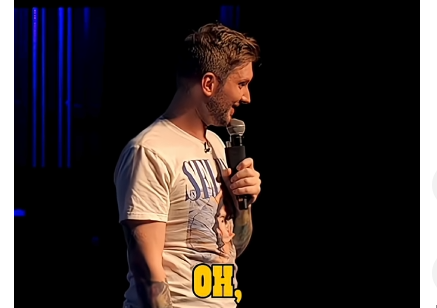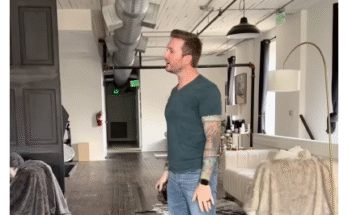🎤 Luke Wasn’t Studying Me: The Comedian’s Nightmare in the Crowd 😂
The ultimate fear of every #standupcomedy performer isn’t bombing; it’s the realization that one specific person in the audience simply isn’t paying attention. When the mic is hot and the room is locked in, spotting one individual—let’s call him Luke—who is completely checked out is a shock to the system. The casual dismissal captured by the line, “Luke wasn’t studying me 🤣,” perfectly encapsulates that hilarious, ego-crushing moment where the comedian must acknowledge the betrayal and pivot.
This is where true comedic skill shines. The audience didn’t pay for a one-sided performance; they paid for a live, shared experience. And Luke, by being distracted, has just become the most important part of the show.
The Comedian vs. The Distraction
The immediate reaction for any #comedian is to try and win the person back. You ramp up the volume, you get closer to the edge of the stage, and you sharpen your wit. But when Luke remains glued to his phone, deep in conversation, or just staring blankly at the ceiling, the comedian has a choice: ignore it and risk the distraction spreading, or address it and turn the distraction into the joke.
A professional chooses the latter. The sudden shift from scripted material to #crowdwork is a high-wire act, but it’s guaranteed to get the rest of the room focused.
The Internal Monologue: The comedian’s mind races: Is he texting? Is he bored? Does he know I can see the entire conversation he’s having about his dog’s diet? This moment of intense, personalized focus gives the comedian license to be brutally funny.
Turning the Betrayal into Punchlines
The #comedian uses Luke’s inattention as a gift, framing the situation for the rest of the audience:
- The Exaggeration: “Look at Luke over here! You know, I’ve seen prison inmates pay closer attention to mandatory safety briefings. What are you doing, Luke? Figuring out the quadratic formula? Or just calculating how many more seconds you have to endure my set?”
- The Personalization: The humor works best when it makes the joke about the comedian’s lack of power. “I spend eight months perfecting this material, sacrificing sleep, missing birthdays, just so Luke could check the weather app on his phone right now. Thanks, Luke. You’re the reason I drink.”
- The Call to Order: When the rest of the audience laughs, the tension is broken. The comic has effectively used peer pressure to bring Luke back into the room, making him the unwilling, temporary star of the show.
Why It’s a Viral Moment on the #fypage
Clips like this go viral because they reveal the humanity of the performance. We all recognize the feeling of being completely invested in something while someone else is completely indifferent. The camera usually captures the dual reactions: the performer’s mock outrage and the audience’s delighted recognition of the social awkwardness.
This moment proves that #standup isn’t just about jokes; it’s about the relationship between the person holding the mic and the room itself. Luke, by not studying the comedian, inadvertently forced the comedian to be better, faster, and more spontaneous. He became the catalyst for one of the most memorable and genuinely unscripted moments of the night.
In the end, while Luke may have missed a few good punchlines, he became the ultimate punchline—and a viral sensation.


